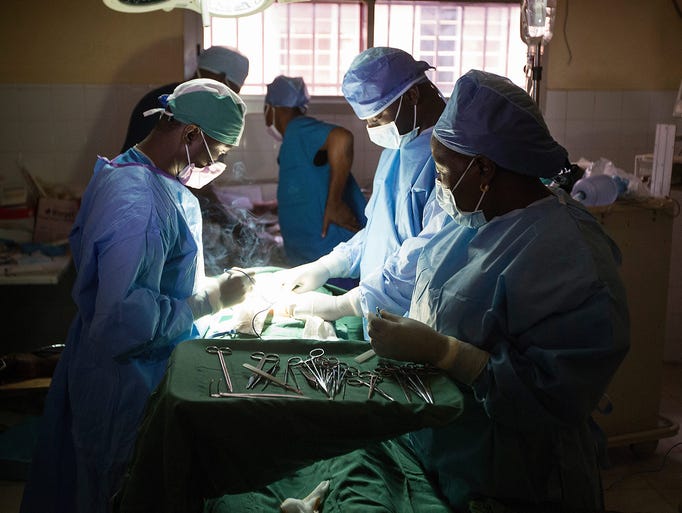MONROVIA, Liberia — A snapshot of the Ebola epidemic raging across West Africa shows a wildfire of infections only slightly contained.
While cases have been on the decline in Liberia, the outbreak is worsening in neighboring countries, where basic Ebola-fighting tools are impractical.
Identifying the infected and those they've touched, and isolating them to break the transmission chain are all but impossible in Sierra Leone's capital of Freetown as well as the jungles of Guinea, says Jordan Tappero, the Centers for Disease Control and Prevention's second-in-command for the regional response.
The new surge of Ebola in Sierra Leone follows a devastating one in Monrovia two months ago. Such a furious spread is something disease trackers say they've never seen in the 38 years since the virus was first identified.
"This is kind of unprecedented or uncharted territory for (fighting) Ebola," Tappero says, particularly in the congested streets of Freetown. "When you get these large urban outbreaks, there's just too many people. Contact tracing teams can't track everybody."
Here in Liberia, new cases continue to pop up, though on a smaller scale, and there are adequate treatment facilities — virtually the only goods news right now in the Ebola war. But as infection clusters still emerge in rural areas of the country, CDC teams rush in like firefighters to assess and assist and are increasingly exhausted, says team leader Kevin DeCock.
"People are stretched. They're running 18 hours a day. It's difficult. And everyone is doing that," DeCock says.
All it took to trigger the current outbreak in Mali was an ailing 70-year-old grand imam from Guinea, who crossed into the country last month and checked into a clinic where he died within two days of Ebola, according to the World Health Organization. Five died and more than 400 required isolation as a result.
"I don't think we can say it's under control" in Mali, Tappero says.
Sierra Leone, where there is a shortage of treatment facilities, is the leading edge of the epidemic right now. In 17 days through Nov. 21, infections increased by 30% to more than 6,000 cases and more than 1,200 deaths, WHO reported. In the same time frame, infections jumped 18% in Guinea and 8.5% in Liberia. Overall, more than 5,400 have died from the virus across West Africa.
In Sierra Leone, the best responders can do is ensure bodies are quickly retrieved and burials carried out safely because of the inability to trace those who have come into contact with Ebola patients, Tappero says.
In neighboring Guinea, key problems are simply reaching infected areas in far-flung villages and overcoming local superstitions that blame Ebola deaths on treatment efforts.
"There is still a great deal of fear in some remote areas that ETUs (Ebola treatment centers) are killing patients," according to a CDC assessment. "We are working out ways to investigate that further and develop counter-messages ... working with a local imam in (the capital) Conakry to push out religious-themed messages which seem to resonate."
Source:usatoday.com



No comments:
Post a Comment